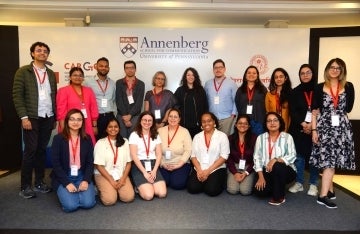Annenberg Graduate Students Win 2019 Ackoff Fellowships
Stefanie Gratale, Do Eon (Donna) Lee, Soojong Kim, and Rui Pei will pursue original research.
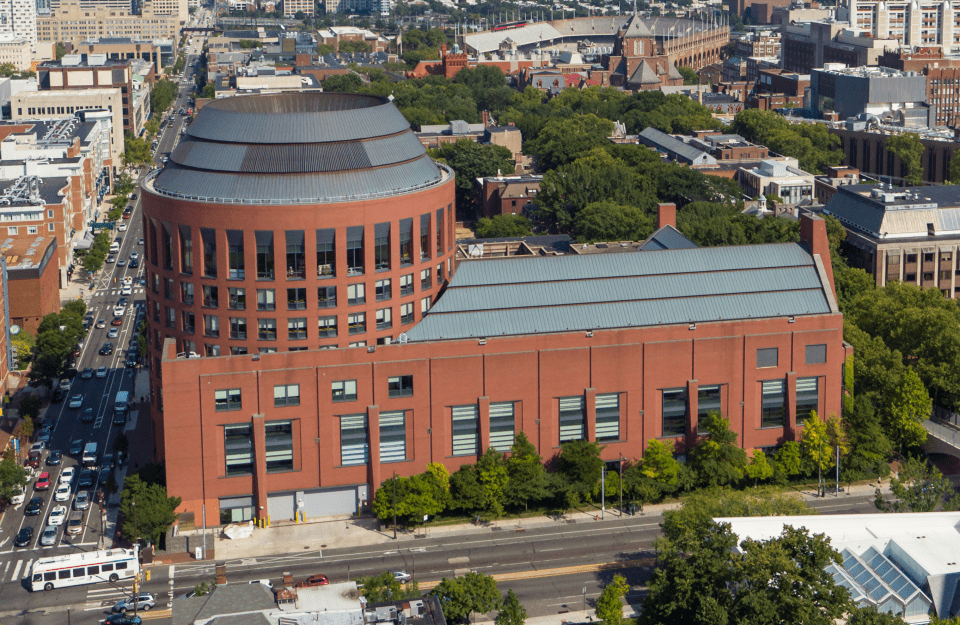
Photo Credit: University of Pennsylvania
Annenberg graduate students Stefanie Gratale, Do Eon (Donna) Lee, Soojong Kim, and Rui Pei have received the Russell Ackoff Doctoral Student Fellowship Award for 2019 from the Wharton Risk Management and Decision Processes Center. This is the fifth year in a row, and the eleventh year overall, that Annenberg students have been fellowship recipients.
The research fellowship, now in its fourteenth year, is named in honor of Russell Ackoff, Professor Emeritus of Management Science, whose work was dedicated to furthering the understanding of human behavior in organizations. Made possible by an endowment from the Anheuser-Busch Charitable Trust, the fellowships are awarded to University of Pennsylvania doctoral students who are pursuing research in decision making under risk and uncertainty.
The Annenberg students' projects are:
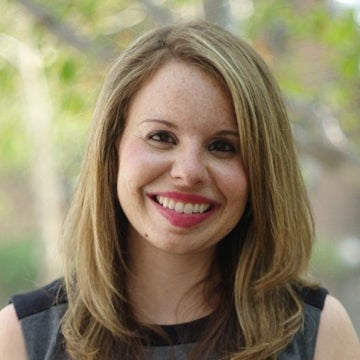
Stefanie Gratale — "Inoculating against Misinformation: Identifying Past Deception to Stop Future Misinformation"
Abstract: Misinformation is increasingly prevalent in the media dialogue, public communication environment, and political exchanges of our “post-truth” era. Research about misinformation points to pernicious, lasting effects of debunked beliefs on attitudes and behaviors, even after correction. Recent scholarship has considered inoculation theory as a strategy to combat misinformation. Inoculation theory is predicated on the premise that forewarning people of a persuasive attempt may confer resistance to it. Gratale's research aims to assess the potential application of inoculation theory in addressing health misinformation; it will, more specifically, examine the relevance of warning about source deception in order to combat misinformation that may affect health-related decisions. In a series of online, randomized experiments, this research will test whether inoculation principles can be harnessed – and what best practices would be – to combat misinformation arising from misleading advertising/health messaging, such as “natural” cigarette marketing. It will then explore whether highlighting prior deception on the part of a message source (e.g., cigarette companies, pharmaceutical industry) increases the efficacy of inoculation messages in combating misinformation and related outcomes such as attitudes and intentions.

Do Eon (Donna) Lee — “What You Read and See: The Influence of Incongruently Valenced Text and Images in Political News on Readers’ Attitudinal Response and Intent to Vote”
Abstract: People utilize different information, and depending on the type of trust, different sources of information perform as the bases in order to calculate the risks and benefits related to trusting someone or not. Among different types of information, mediated information plays a crucial role in both forming a generalized social trust and political trust. In understanding how people interpret mediated information and how it affects readers, most previous studies have focused on the effect of one form of information — either text or picture. In the current era of digital media, however, readers are exposed to both pictorial and textual information simultaneously. Therefore, this study will study how individuals utilize different forms of mediated information (such as text vs. image) to build trust in the other person. Also, even in the studies that attempted to explicate the cases in which people process different forms of information simultaneously, they are limited to the cases in which valences of text and image match (e.g., positively valenced text with positively valenced picture). Yet, there are many articles containing incongruently valenced combinations of text and image, often found during election periods. Thus, this study will also explore how the valence of those forms of information influences the mechanism of trust building. This study, therefore, is intended to fill the gaps in the current literature by studying how the two main forms of information — textual and pictorial information — influence individuals to show trusting attitudes and behaviors, both when their valences are in accordance with each other and are not. By creating a piece of a political article featuring an imaginary candidate running for the 2019 gubernatorial election, this experiment will examine the influence of image and text, and the congruency of the valences of the two pieces of information on individual’s decision on building of trust and display of trust-related behaviors. This study is expected to provide a more extensive and realistic understanding of both information processing mechanism and trust formation based on that information processing.
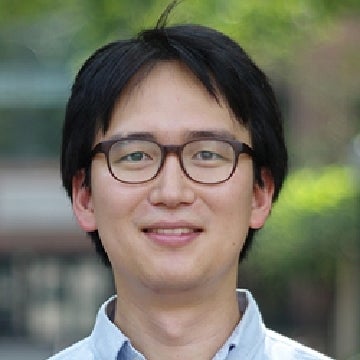
Soojong Kim — "How Social Dynamics Influence the Persuasiveness and Virality of Misinformation"
Abstract: There has been a growing concern about the prevalence of misinformation in social media and its detrimental impacts on society. Unsubstantiated and manipulated information could exacerbate biased behavior and perception, undermine the trust and adoption of evidence-based science, and create unjustified fear and hate. What makes misinformation viral? What makes it more persuasive? Previous studies of these questions have focused on the characteristics of misleading contents and misinformation spreaders. However, scholars have largely overlooked “social conditions” that may accelerate and amplify the impacts of misinformation. To investigate the virality and the persuasiveness of misinformation, one should examine how people exchange misinformation on social networks and how they perceive it while interacting with others. Behavioral decisions in this complex social environment involve a considerable level of uncertainty: to obtain psychological benefits and to manage social capital, people have to consider not only information contents but also the characteristics and behaviors of other people. Based on web-based experiments, the proposed research investigates the influence of three social factors on the perception and sharing of misinformation: the level of ingroup interaction, the level of falsehood, and the level of network homogeneity.
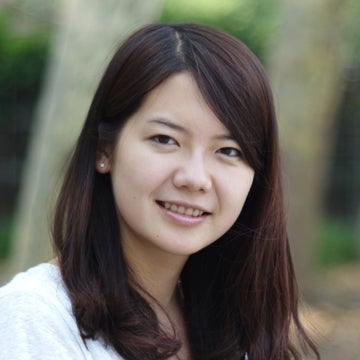
Rui Pei — "Developmental Trajectory of Peer Influence Effects on Adolescent Decision Making: A Cultural Perspective"
Abstract: The opinions and behaviors of peers are among the most potent factors influencing decision making under risk and uncertainty, and the extent that individuals are susceptible to peer influence varies across adolescence. In particular, extensive research shows that individuals become less susceptible to peer influence from late adolescence to adulthood. However, these studies have been primarily conducted in Western societies. Less is known about whether this developmental trajectory is a universal developmental phenomenon or may be dependent on cultural values. Based on pilot data, Pei hypothesizes that cultural context moderates the relation between age and tendencies to resist peer influence in adolescents, such that adolescents “soak up” their culture's values over the course of development, and become more likely to resist or accept peer influence according to their cultural context. Findings can contribute to our understanding of how universal phenomena and cultural contexts interact to influence adolescent decision making and development, and bring practical implications on developmental opportunities such as promoting positive risk-taking and healthy behaviors in adolescents.
Recent previous winners include: Elisa Baek, Natalie Herbert, Danny Kim, Hye-Yon Lee, and Allyson Volinsky in 2018; Joshua Becker and Elissa Kranzler in 2017; and Natalie Herbert, Stella Lee, Sijia Yang, and Lori Young in 2016.



